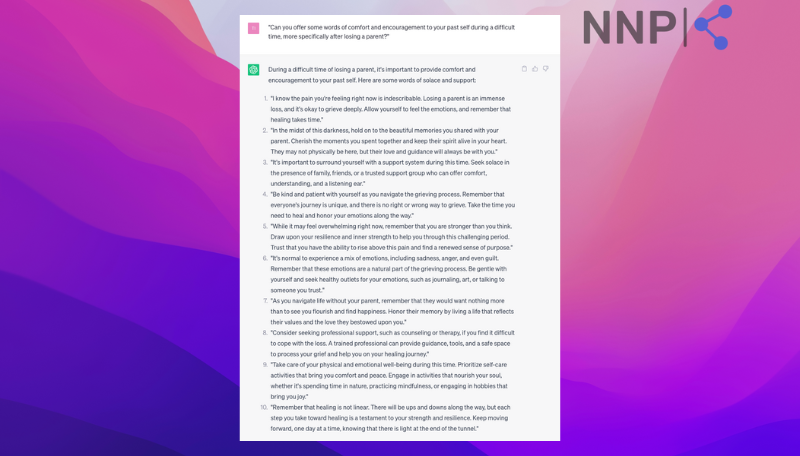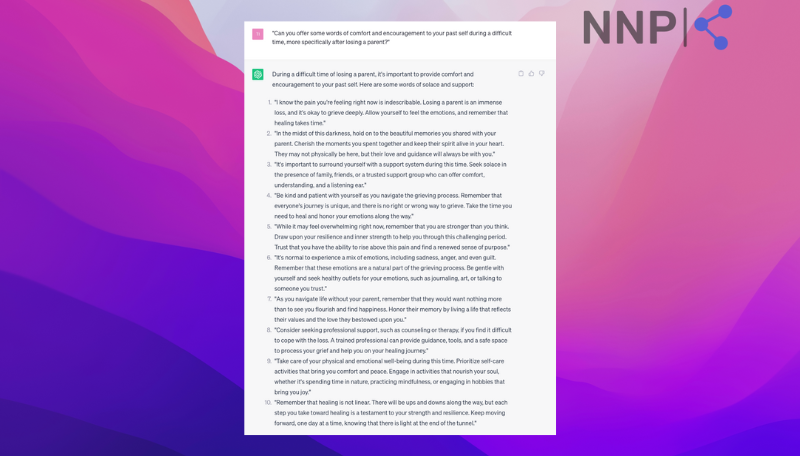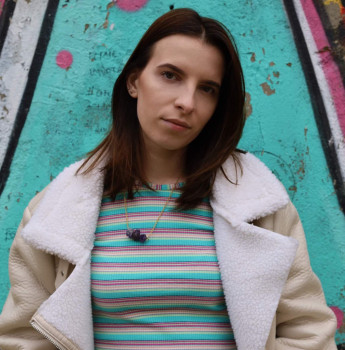ChatGPT as a Diary: How to Talk to Your Past Self for Better Healing
Imagine having a diary that can record your thoughts and have conversations with you. That's the intriguing concept behind using ChatGPT as a diary. In today's digital age, where technology continues to push boundaries, this innovative approach allows individuals to engage in dynamic dialogues with their past selves.
Instead of simply jotting down thoughts and reflections, ChatGPT offers the opportunity to have interactive conversations, simulating a personal dialogue with your younger self.
The potential benefits of talking to one's past self for healing
Talking to our past selves might sound like a fantastical notion, but it holds significant potential for healing and personal growth. Revisiting past experiences and conversing with our younger selves can lead to profound insights and emotional healing.
Through the lens of hindsight and with the assistance of ChatGPT, we can offer compassionate advice, provide comfort, and offer support to our past selves. This process enhances our understanding of our journey and promotes self-compassion as we acknowledge the challenges we've overcome.
The therapeutic value of self-reflection
Self-reflection is a powerful tool for personal growth and healing; diaries have long been recognized as a means for engaging in this process. Taking the time to introspect and express our thoughts and emotions allows us to gain insight into our experiences and understand ourselves more deeply.
We can uncover patterns, identify triggers, and gain a clearer perspective on our emotions and behaviors through self-reflection. Diaries provide a private and non-judgmental space to explore our inner thoughts, facilitating a therapeutic process of self-discovery and self-awareness.
💡 Check out also how to use ChatGPT as your personal psychologist.
How diaries aid in emotional processing and catharsis
Emotional processing is essential to healing, and diaries serve as a valuable outlet. When we write about our experiences, feelings, and challenges, we engage in a cathartic release of emotions.
The act of putting our thoughts and emotions into words can help us make sense of our experiences, unravel complex feelings, and release pent-up emotions. Diaries offer a safe and non-threatening space where we can express ourselves freely, allowing for emotional catharsis and creating a sense of relief and clarity.
Limitations of traditional diary writing
While traditional diary writing has its merits, it also has limitations. Firstly, diaries are static and one-sided, lacking the interactive nature of conversations. They provide a platform for self-expression but do not offer the opportunity for direct feedback or guidance.
Additionally, traditional diaries rely solely on our own perspectives, which can sometimes limit our ability to gain new insights or see alternative viewpoints. Moreover, deciphering the meaning behind our writings can be challenging at times, as the context and emotional state in which entries were written may fade over time.
Setting specific intentions for the conversations
To make the most of using ChatGPT as a diary for healing, it is important to set specific intentions for your conversations. Before engaging with ChatGPT, take some time to reflect on what you hope to achieve or explore through these dialogues.
It could be gaining clarity on a past event, seeking emotional support, or uncovering patterns in your thoughts and behaviors. Setting clear intentions provides a framework for the conversations and enhances their therapeutic value.
Creating a safe and judgment-free environment
Creating a safe and judgment-free environment is crucial when using ChatGPT as a diary. ChatGPT is an AI language model, and its responses are generated based on patterns and data. It's important to approach the conversations openly and treat them as a tool for self-reflection rather than absolute truth.
Cultivate a mindset of self-compassion and non-judgment, allowing yourself to express your thoughts and emotions freely. Creating a safe space can foster trust and vulnerability, facilitating deeper healing.
Engaging in a back-and-forth dialogue with ChatGPT
Unlike traditional diary writing, where entries are typically one-sided, ChatGPT offers a unique opportunity for a back-and-forth dialogue. Engage with ChatGPT by asking questions, seeking advice, or expressing your concerns.
Treat the conversations as genuine exchanges, allowing ChatGPT to respond and guide the dialogue. This interactive nature can help you gain new insights, challenge your perspectives, and promote a sense of connection and companionship. Remember to approach the conversation with an open mind, exploring different angles and viewpoints.
✨ You might also like to read 6 Entertaining Uses of ChatGPT You Never Knew Were Possible
Prompts to Use to Start a Healing Journey With ChatGPT
- "What advice would you give to your younger self regarding a major decision you made?"
- "Can you offer some words of comfort and encouragement to your past self during a difficult time?"
- "Reflecting on a past failure or setback, what valuable lesson did you learn from it?"
- "Imagine you could provide guidance to your younger self before a significant life event. What would you say?"
- "If you could share one piece of wisdom with your past self about self-care and well-being, what would it be?"
- "Describe a challenge or obstacle you faced in the past. How did you overcome it, and what advice would you give yourself?"
- "Reflecting on a past relationship, what insights or lessons have you gained that you would share with your younger self?"
- "What positive affirmations or reminders would you offer to your past self to boost their confidence and self-belief?"
- "If you could help your past self reframe a negative mindset or belief, what alternative perspective would you provide?"
- "Imagine you could share the joy and accomplishments you've experienced since your past self faced a particular hardship. How would you celebrate and encourage them?"
These prompts can serve as a starting point for engaging in meaningful conversations with your past self through ChatGPT. Feel free to modify or expand upon them based on your personal experiences and desired areas of reflection.
Example 1:
"What advice would you give to your younger self regarding the major decision you made to move out of the country when you turned 16?"

Example 2:
"Can you offer some words of comfort and encouragement to your past self during a difficult time, more specifically after losing a parent?"

Conclusion
In conclusion, using ChatGPT as a diary for engaging in conversations with our past selves holds immense potential for healing and personal growth. By harnessing the power of technology, we can embark on a transformative journey of self-reflection, emotional processing, and self-discovery. Throughout this article, we explored the concept of using ChatGPT as a diary and its myriad benefits.
We began by understanding the therapeutic value of self-reflection and how traditional diaries aid in emotional processing and catharsis. We acknowledged the limitations of traditional diary writing and recognized the need for a dynamic and interactive approach to deepen the healing process. ChatGPT emerged as a remarkable solution, providing a virtual conversational partner that opens new doors for introspection and understanding.
Strategies for utilizing ChatGPT as a diary for healing were discussed, emphasizing the importance of setting intentions, creating a safe environment, and engaging in back-and-forth dialogues. These strategies provide a framework for meaningful and transformative conversations with our past selves, enabling us to offer advice, comfort, and support.
An important note, however, is that ChatGPT can only serve as an assisting tool in your healing journey. To initiate your healing journey, contact a psychologist or a psychiatrist.
-
What are the limitations of using ChatGPT as a diary for healing?
-
While ChatGPT can facilitate self-reflection and provide valuable insights, it's essential to recognize that it is not a substitute for professional help. It lacks the empathy and nuanced understanding that human interaction can offer. Therefore, it's crucial to combine its use with professional therapeutic support for a comprehensive healing journey.
-
How can talking to our past selves aid in emotional healing?
-
Talking to our past selves allows us to provide the much-needed compassion, understanding, and guidance we may have lacked during difficult times. Through the lens of experience and with the assistance of ChatGPT, we can offer insights and comfort that promote emotional healing and growth.
-
How does using ChatGPT as a diary differ from traditional diary writing?
-
ChatGPT as a diary transcends the static nature of traditional diaries, offering an interactive platform for engaging conversations. Unlike traditional diaries that rely solely on our own perspectives, ChatGPT can provide diverse insights and guidance, making the self-reflection process more dynamic and comprehensive.
-
Can ChatGPT truly provide a safe and non-judgmental environment for self-expression?
-
ChatGPT operates within the boundaries of programmed algorithms and data, making it a non-judgmental tool. However, it's important to approach the conversations with a discerning mind, understanding that it reflects patterns and data and should be utilized as a supplement to professional guidance, rather than a sole source of support.
-
How can one ensure that the conversations with ChatGPT lead to genuine self-discovery?
-
To ensure meaningful self-discovery, it's crucial to engage in open and honest dialogues with ChatGPT. Treat the conversations as genuine exchanges, allowing ChatGPT's responses to challenge your perspectives and encourage you to explore different angles. This open-minded approach can lead to profound insights and personal growth.

